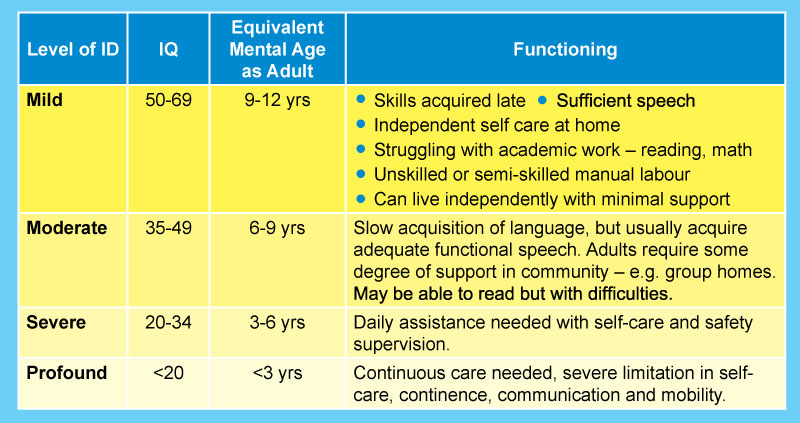Children with ID will learn and progress, but will be slower in acquiring new skills. These children will continue to have impairments with learning and independent living skills in school and as adults.
The outcome in children with a definite cause of ID should be discussed with the doctor, as it varies depending on the underlying condition and the severity of ID. The table illustrates outcomes as adults based on adult IQ.
Support In School
Simply ‘mainstreaming’ a child with ID into a classroom without understanding and addressing their individual needs does not guarantee them a full, equitable and inclusive education. They will find it difficult to cope with the mainstream education curriculum.
Anxiety and behavioural difficulties will occur if:
- a child is bored in class
- the curriculum is too demanding
- unrealistic expectations by adults
- bullying
In a special needs class, children should be given opportunities for inclusion, for example during art, physical education and music. Children with mild and moderate ID will be able to acquire some reading ability. Special needs teachers use a combination of strategies such as phonemic (letter and syllable sounds) awareness, word recognition, comprehension and oral language. It is important to understand that children with ID are not ‘naughty’, ‘disobedient’ or ‘stupid’, but they genuinely have difficulty learning and acquiring new skills. Be patient, stay positive and reward good behaviour and effort.
Developing Life Skills
While academic development is important, parents should not neglect developing their child’s adaptive skills (also referred as functional or life skills). Training in life skills is one of the most important interventions for people with ID: self-care skills such as eating, dressing and bathing; plus daily skills like shopping, banking, phone use and housekeeping. Being able to do these things on their own helps prepare them to live independently.
What you can do early on is to involve them in daily activities around the house:
- Learn new skills and develop their independence
- Feel valued, useful and respected
- Be active and participate
- Improve communication skills
- Explore, choose and increase self-determination
Tips to teach life skills
- Start teaching a new skill when your child shows he or she is ready. Help your child understand the purpose of an activity and the steps involved, this helps learning the skill much easier.
- Teach a skill one step at a time by breaking them down. For example, taking a shower:
- Take off clothes
- Put on a towel
- Turn on the shower
- Scrub body with soap and rinse
- Dry body with towel
- Establish routines to make it easier for your child to learn daily living skills and become more independent.
- Use pictures of activities in a sequential order as and when they would appear each day. It is a great way to promote independence and help your child learn routines.
- Provide direct and immediate feedback in order to form connection between cause and effect.
Teaching Sexual Health & Awareness
Children with ID are 5 times more likely to be victims of sex abuse. Parents and educators are key individuals providing information regarding reproductive and sexual health. This is very important to prevent sexual abuse.
Pictures can be used to aid understanding. It is never too early to teach a child regarding “private” body parts which should not be exposed or touched by others. General guidelines for parents are available from www.myhealth.gov.my/en/sexual-health-for-specialadolescent
State Benefits for those with ID
All children with ID diagnosis or ‘kurang upaya intelektual’ are entitled to ‘kad kanak-kanak kurang upaya’. Treatment in government hospitals is free, and children attending government schools from Standard 1 are entitled to RM150 per month (from the Ministry of Education). More information is available at the Jabatan Kebajikan website at www.jkm.gov.my
People Who Want to Help You Are Everywhere
There are many government and NGOs with information and resources for individuals with ID.
- Kiwanis disability information and support centre: Information on professionals, therapists, early intervention centres, government health, education and social services: www.disabilitymalaysia.com
- Malaysian Information Network on Disabilities: www.mind.org.my
- Selangor and Federal Territory Association for the Mentally Handicapped: runs programs for individuals with intellectual disability throughout the lifespan, including early intervention, special needs school, a sheltered workshop and vocational training: mysamh.org
- Malaysian Care: NGO with several programmes for children with developmental disabilities: www.malaysiancare.org
- United Voice: the first society in Malaysia led by persons with learning disabilities. The organisation runs job coaching programmes and vocational training for job placements: www.unitedvoice.com.my
It’s important to remember that those with ID also have strengths that should not be overlooked. Early intervention tailored for the individual’s specific needs will make a difference. Later in life, special education, vocational programmes and community support can wield positive results. With the right treatment, a person with an intellectual disability can lead a fulfilling, productive life.
Continue Reading…







Comments